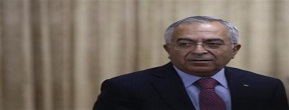Reuters: Embattled Palestinian Prime Minister Fayyad quits
 Palestinian Prime Minister Salam Fayyad quit on Saturday after months of tension with President Mahmoud Abbas, leaving the administration in disarray just as the United States tries to revive peace talks with Israel.
Palestinian Prime Minister Salam Fayyad quit on Saturday after months of tension with President Mahmoud Abbas, leaving the administration in disarray just as the United States tries to revive peace talks with Israel.
Abbas, who has been unhappy with Fayyad's handling of the cash-strapped government, accepted the resignation and asked Fayyad to stay on as caretaker until a new government is formed, according to official Palestinian news agency WAFA.
Palestinian law requires the president to appoint a new prime minister within two weeks.
Fayyad, a Texas-educated former World Bank official, is credited with helping create institutions in the occupied West Bank which would be needed if the Palestinians are to gain independence from Israeli occupation.
Sources told Reuters on Wednesday that Fayyad offered to resign. Fayyad, appointed prime minister in 2007, had offered to stand down before, only for Abbas to reject his requests after pressure from Western donors..
Western diplomats expressed dismay at the latest turmoil within the Palestinian Authority at a time when the United States is making a concerted effort to revive peace negotiations with Israel and boost the local economy.
During a visit to the region last month, U.S. President Barack Obama praised Fayyad, and Secretary of State John Kerry held private talks with the beleaguered prime minister earlier this week, in a gesture of support.
Admired abroad, including in Israel, Fayyad has failed to build a strong political base within the Palestinian territories, leaving him vulnerable to attacks from Abbas's Fatah party and the Islamist group Hamas, which governs in Gaza.
ECONOMIC CRISIS
Fayyad's reputation among Palestinians suffered as policy missteps and economic hardships abounded � While Fayyad was one of the few senior politicians to frequently visit marginalized communities and ask after their concerns, tax and commodity price hikes repeatedly stoked angry street protests against him.
Palestinian unemployment has risen to almost 25 percent and real GDP growth is set to fall from an average of 11 percent in 2010-11 to just 5 percent in 2013, according to the World Bank.
Kerry said on Tuesday he was preparing measures to boost growth in the West Bank, which is partially controlled by the Palestinian Authority. The plans were due to be unveiled in Washington next week.
A senior Fatah official said he had doubts about Fayyad's resignation. "We can't judge the seriousness of this move until the president appoints a new prime minister. I feel as if this is an artifice to keep things as they are," the official, who spoke on condition of anonymity, said.
Fayyad's problems grew last year when foreign aid started to slow. The situation worsened at the end of the year when Washington froze funding to punish the Palestinians for gaining de-facto statehood recognition at the United Nations.
Israel also withheld tax revenues it collects on behalf of the Palestinians in November and December in response to the unilateral U.N. move, making it impossible for Fayyad to keep up with already delayed public sector salary payments.
Sources close to Fayyad accuse Fatah of stirring discontent, in a bid for more control over Palestinian coffers. The sources complain Abbas did not give his prime minister enough support.
Relations between the two men soured further last month when Finance Minister Nabil Qassis quit, saying the government had failed to address a gaping budget deficit. Fayyad accepted the resignation, against the wishes of Abbas.
Hamas welcomed Fayyad's departure. It has accused him of helping Israel maintain its partial blockade on the Gaza Strip.
"Fayyad leaves the government after he drowned our people in debts," Hamas spokesman, Sami Abu Zuhri, said.
Hamas won national elections across the Palestinian territories in 2006 and seized control of Gaza the following year after falling out with Fatah. In response to the brief civil war, Abbas named Fayyad as his prime minister.
Source: shafaqna
Add new comment